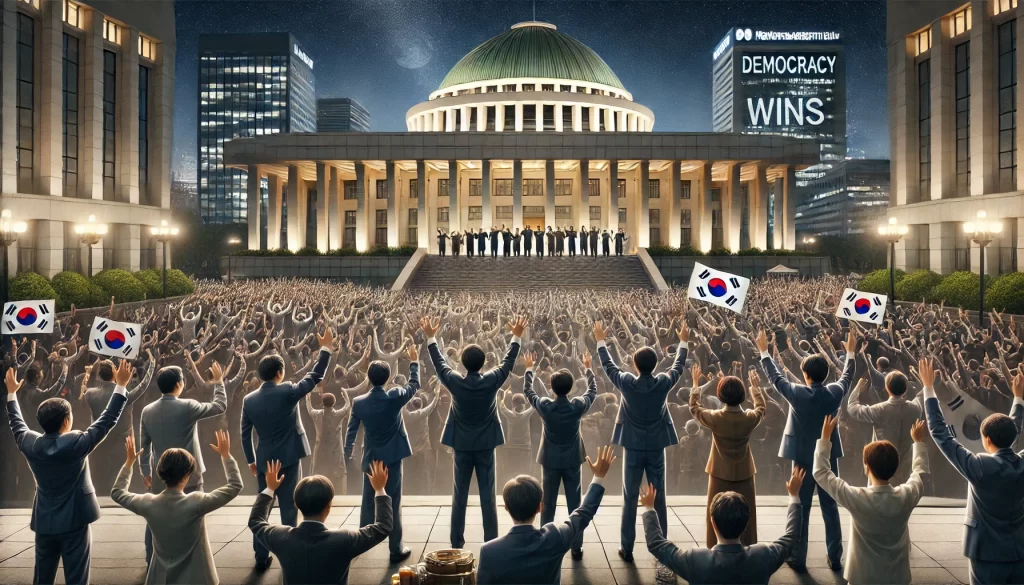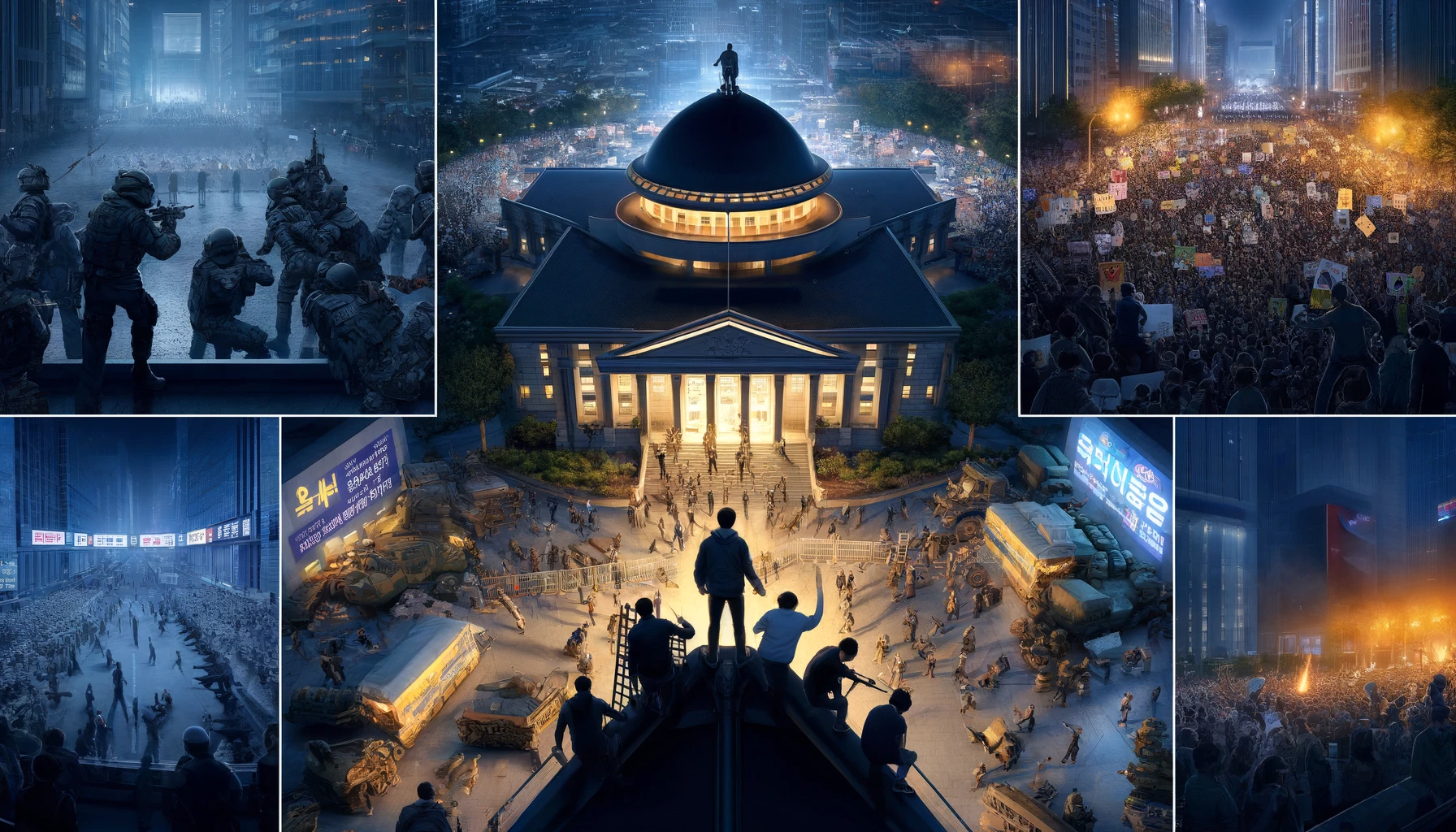On December 3, 2024, South Korean President Yoon Suk Yeol shocked the nation by imposing martial law, an action that sparked widespread protests and raised serious questions about the state of the country’s democracy. The measure, announced late at night, marked the first time since the 1980s that such an authoritarian step had been taken. Within six hours, the National Assembly acted decisively to overturn the order, leaving the president politically weakened and facing calls for his impeachment.
The Announcement
President Yoon announced the martial law declaration at 11:00 PM local time, citing a need to suppress “anti-state” forces allegedly sympathetic to North Korea. The announcement was made against a backdrop of increasing political tension, with the president embroiled in corruption allegations, cabinet investigations, and a legislative deadlock over the national budget. Martial law allowed the military to suspend political activities, control the press, and detain individuals without warrants, claiming to protect public order. General Park An-Su, appointed as martial law commander, ordered political rallies and labor activities to cease and threatened arrests for disobedience.
Immediate Public Outcry
The announcement triggered a public uproar. Thousands of citizens took to the streets, particularly outside the National Assembly building in Seoul, chanting “End martial law!” Protesters, defying military and police barricades, sought to demonstrate their outrage against what many perceived as a significant backslide in democratic governance. Tensions escalated as military vehicles and soldiers arrived, with some protesters lying in the street to block their advance.
Observers, including university students and political analysts, were shocked by the sudden action. “This is a move I never expected to see in the 21st century in South Korea,” remarked Juye Hong, a Seoul student. Another observer noted the sharp contrast between the protests and the city’s otherwise normal weekday activities, highlighting widespread confusion among the population.
Parliamentary Response
The National Assembly responded swiftly, convening an emergency session to address the crisis. Lawmakers, including some from Yoon’s conservative People Power Party, worked through the night to counter the martial law order. In dramatic scenes, opposition leaders like Lee Jae-myung called for public support via livestreams and rallied lawmakers to assemble for a vote. Some were seen climbing walls to enter the Assembly, as troops attempted to block access.
In a unanimous 190-0 vote, legislators declared the martial law order invalid, forcing President Yoon to rescind it by early morning. This marked a significant rebuke, with lawmakers describing Yoon’s actions as unconstitutional. “Even with our unfortunate memories of military coups, our citizens have surely observed the events of today and saw the maturity of our military,” said National Assembly Speaker Woo Won-shik, referencing South Korea’s authoritarian past.

Political Fallout
The swift reversal of martial law left President Yoon politically vulnerable. Opposition parties, led by the Democratic Party, called for Yoon’s resignation and submitted a motion for impeachment. The motion requires a two-thirds majority in the 300-seat parliament and approval by the Constitutional Court to succeed. If impeached, Prime Minister Han Duck-soo would temporarily assume presidential duties while the court deliberates.
President Yoon’s actions were widely criticized as an overreach of executive power. “Yoon’s martial law declaration was a clear violation of the constitution,” stated an opposition leader. Critics argued that no national emergency justified the use of martial law, which is constitutionally reserved for wartime or comparable crises. Moreover, experts viewed the move as an attempt to suppress opposition rather than address legitimate security concerns.
Historical Context
South Korea’s last martial law declaration occurred in 1979 under its military dictatorship, making this episode a startling reminder of the nation’s authoritarian past. The country transitioned to democracy in 1987, and scenes of soldiers deploying to control protests or legislative activities had since been absent from public life. President Yoon’s move drew comparisons to those darker times and highlighted the fragility of democratic norms.
Next Steps
President Yoon now faces widespread public discontent and institutional challenges. Protesters continue to demand his resignation, while the Democratic Party pushes for impeachment. The Constitutional Court, which must approve any impeachment vote, currently lacks three justices, potentially delaying proceedings. Meanwhile, South Korea’s political landscape remains deeply polarized, with critics accusing Yoon of undermining democratic principles during his presidency.
The events of December 3 have left an indelible mark on South Korea’s political history, demonstrating the strength of its institutions to resist authoritarianism while exposing vulnerabilities in its governance. Observers continue to question the long-term impact on the country’s democracy and the legacy of its embattled president.
This article is based on the following articles:
https://www.nytimes.com/2024/12/03/world/asia/what-is-martial-law-south-korea.html
https://www.bbc.com/news/articles/c98lygwd837o
https://apnews.com/article/south-korea-yoon-martial-law-25a2a7c957e77a19f771b6b7c56a2173

Background Information
What is Martial Law?
Martial law refers to the temporary imposition of military control over civilian government functions during times of extreme crisis. Under martial law, civil liberties such as freedom of speech, assembly, and press may be suspended, and military authorities may take control of law enforcement and public order.
In South Korea, martial law is constitutionally permitted only under specific circumstances, such as war, armed conflict, or comparable national emergencies. However, such measures are highly controversial because they grant the military extraordinary powers, often leading to significant restrictions on democratic freedoms.
South Korea’s Democratic Evolution
South Korea’s journey to becoming a democracy was a long and difficult process. The country endured decades of authoritarian rule under military regimes following the Korean War (1950–1953). Key moments in this history include:
- Military Dictatorships (1960s–1980s): South Korea was governed by a series of military-backed leaders who suppressed political dissent and used martial law to maintain control.
- The Gwangju Uprising (1980): In a major pro-democracy movement, citizens of Gwangju protested against martial law. The government violently suppressed the protests, resulting in hundreds of deaths. This event became a symbol of resistance against authoritarian rule.
- Transition to Democracy (1987): Mass protests and international pressure led to constitutional reforms, marking the beginning of South Korea’s democratic era. Since then, the country has held free elections and established robust democratic institutions.
South Korea’s Current Political System
South Korea is a democratic republic with a president as the head of state. The president is elected for a single five-year term and has significant powers, including serving as the commander-in-chief of the military. However, these powers are balanced by the National Assembly, South Korea’s legislative body, which has the authority to pass laws, approve budgets, and impeach the president if necessary.
The National Assembly consists of 300 members, including representatives from various political parties. The two largest parties are:
- The People Power Party (PPP): A conservative party currently associated with President Yoon Suk Yeol.
- The Democratic Party of Korea (DPK): A liberal party that controls the majority in the Assembly.
The president and the National Assembly often clash when they represent opposing political ideologies, leading to gridlock and political tension.
What Makes This Event Significant?
- Democratic Norms: South Korea’s democracy is relatively young, with its roots in the late 1980s. Events like the declaration of martial law can test the country’s commitment to democratic values.
- Checks and Balances: The swift action by the National Assembly to overturn martial law demonstrates the strength of South Korea’s democratic institutions. It also highlights the importance of checks and balances in preventing abuses of power.
- Global Implications: South Korea is a key ally of the United States and an important player in East Asian politics. Instability in its government can have broader effects on regional security, particularly given ongoing tensions with North Korea.
A Brief Introduction to Yoon Suk Yeol
President Yoon Suk Yeol was elected in 2022 after a narrow victory. A former prosecutor, Yoon campaigned on promises of strengthening South Korea’s democracy and taking a tougher stance on North Korea. However, his presidency has been marred by controversies, including allegations of corruption and political misconduct. His declaration of martial law has drawn widespread criticism, further complicating his administration.
Historical Importance of Martial Law in South Korea
The declaration of martial law is rare in South Korea’s modern history. The last significant instance occurred in 1979, during a period of military dictatorship. For many South Koreans, this history evokes painful memories of political oppression, making any reintroduction of martial law highly sensitive and controversial.
South Korea’s Geopolitical Context
South Korea is located on the Korean Peninsula, sharing a border with North Korea. The two nations have been technically at war since the Korean War (1950–1953) ended in an armistice rather than a peace treaty. This ongoing conflict has shaped South Korea’s politics, security policies, and relations with allies like the United States.

Debate/Essay Questions
- Should a president be allowed to declare martial law without consulting parliament or other branches of government? Why or why not?
- Should citizens have the right to protest actions like martial law, even if they are declared in the name of national security?
- What lessons can other countries learn from South Korea’s swift repeal of martial law?
- Should the criteria for declaring martial law be stricter to avoid future controversies?
Please subscribe to Insight Fortnight, our biweekly newsletter!
